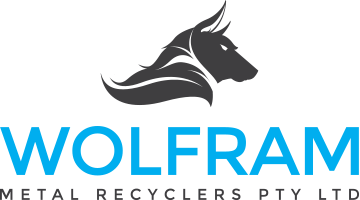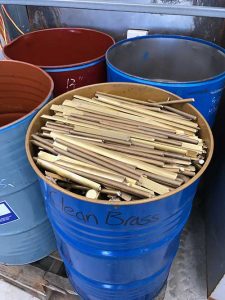Brass Scrap in Rockingham
Wolfram Metal Recyclers buys and sells Brass Scrap in Rockingham, Port Kennedy, Mandurah and surrounding areas. Contact us today for competitive pricing on Brass Scrap Metal.
Buying and Selling Brass Scrap Metal
Brass Scrap will be brought in 2 categories:
- Mixed Brass (Clean): Clean Brass with no attachments such as steel, plastic, rubber and must be free of oil and grease.
- Coast Brass (Dirty): Brass is allowed to have 15% – 20% contamination i.e. steel. But must be free of oil and grease.
Mixed Brass (Clean)
Shall consist of mixed yellow brass solids including brass castings, rolled brass, rod brass, tubing and miscellaneous yellow brasses, including plated brass. Must be free of manganese-bronze, aluminum-bronze, unsweated radiators or radiator parts, iron and excessively dirty and corroded materials. Must also be free of any type of munitions including, but not limited to, bullet castings.
Coast Brass (Dirty)
Will contain predominately honey brass and other red brasses typically sold as 85% clean.
Gun Metal
Typically under 300mm x 300mm in size, free of oil and grease. To be sold as being suitable for melt scrap without processing.
Brass Clippings
Shall consist of the cuttings of new unleaded yellow brass sheet or plate, to be clean and free from foreign substances and not to contain more than 10% of clean brass punching under ¼ inch. To be free of Muntz metal and naval brass.
Brass Swarf
Shall consist of strictly rod turnings, free of aluminum, manganese, composition, Tobin and Muntz metal turnings ; not to contain over 3% free iron, oil or other moisture ; to be free of grindings and babbitts ; to contain not more than 0.30% tin and not more than 0.15% alloyed iron.
Mixed Unsweated Auto Radiators
Shall consist of mixed automobile radiators, to be free of aluminum radiators and iron-finned radiators. All radiators to be subject to deduction of actual iron. The tonnage specification should cover the gross weight of the radiators unless otherwise specified.
Brass History and Uses
Brass is a metal alloy made of copper and zinc; the proportions of zinc and copper can be varied to create a range of brasses with varying properties. It is a substitutionally alloy: atoms of the two constituents may replace each other within the same crystal structure.
By comparison, bronze is principally an alloy of copper and tin. However, bronze and brass may also include small proportions of a range of other elements including arsenic, phosphorus, aluminium, manganese, and silicon. The term is also applied to a variety of brasses, and the distinction is largely historical. Modern practice in museums and archaeology increasingly avoids both terms for historical objects in favour of the all-embracing “copper alloy”.
Brass is used for decoration for its bright gold-like appearance; for applications where low friction is required such as locks, gears, bearings, doorknobs, ammunition casings and valves; for plumbing and electrical applications; and extensively in brass musical instruments such as horns and bells where a combination of high workability (historically with hand tools) and durability is desired. It is also used in zippers. Brass is often used in situations in which it is important that sparks not be struck, such as in fittings and tools used near flammable or explosive materials.
Brass can be found around the house in the forms of:
- Taps
- Fittings
- Shower Heads
- Water Meters
- Shells (Bullets)

